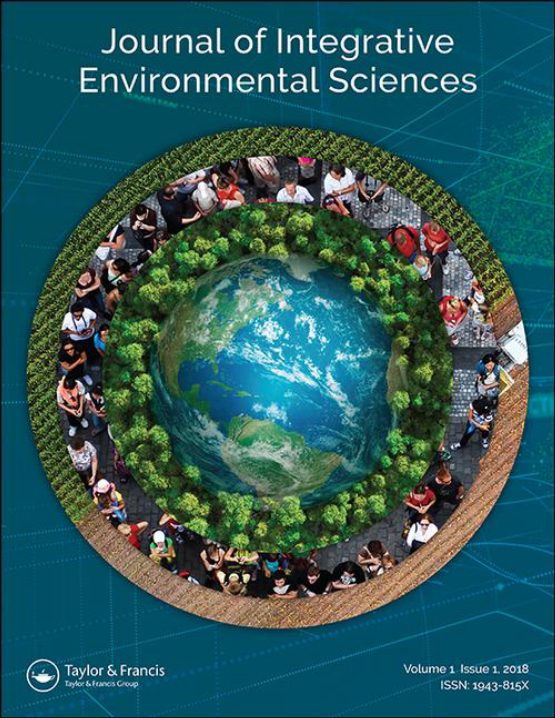Submit a Manuscript to the Journal
Journal of Integrative Environmental Sciences
For an Article Collection on
Innovative Approaches to Climate Change Adaptation: Bridging Science and Practice
Manuscript deadline
30 September 2024

Article collection guest advisor(s)
Prof. Anjal Prakash,
Bharti Institute of Public Policy, Indian School of Business
[email protected]
Prof. Purnamita Dasgupta,
Institute of Economic Growth, India
[email protected]
Prof. Dale Rothman,
George Mason University, USA
[email protected]
Innovative Approaches to Climate Change Adaptation: Bridging Science and Practice
Climate change poses unprecedented challenges to communities worldwide, necessitating innovative and integrative approaches to adaptation that combine scientific knowledge and practical solutions. This Article Collection aims to showcase cutting-edge research and initiatives that integrate across the sciences and also bridge the gap between scientific understanding and on-the-ground implementation of climate change adaptation measures. By focusing on novel approaches, lessons learned, and successful case studies, this collection of articles will contribute to advancing climate change adaptation strategies globally.
This collection on "Innovative Approaches to Climate Change Adaptation: Bridging Science and Practice" is important because it provides a platform to showcase and disseminate cutting-edge research and initiatives that successfully integrate across the sciences and also link scientific knowledge with on-the-ground implementation. This collection contributes to the advancement of climate change adaptation strategies worldwide by highlighting novel approaches, lessons learned, and successful case studies. It allows researchers, policymakers, and practitioners to exchange ideas and experiences, fostering collaboration and innovation in addressing the impacts of climate change. The articles featured in this collection will offer valuable insights into the most effective and sustainable adaptation measures, helping communities and decision-makers develop resilient strategies to mitigate the adverse effects of climate change. Furthermore, this collection emphasizes the importance of practical solutions that can be implemented at various scales, from local communities to national policies. It recognizes the need to combine scientific knowledge with real-world experience and indigenous wisdom to develop comprehensive and context-specific adaptation approaches. By showcasing successful examples of bridging the gap between science and practice, this collection aims to inspire and inform future efforts in climate change adaptation, ultimately contributing to building a more sustainable and resilient future for all.
Suggested Topics for Contributions:
- Nature-Based Solutions for Climate Change Adaptation: Explore innovative nature-based approaches such as reforestation, green infrastructure, and ecosystem restoration to enhance climate resilience, biodiversity conservation, and community well-being.
- Urban Resilience: Integrate climate change adaptation into urban planning and infrastructure development, focusing on strategies like sustainable transportation, green building design, and community engagement for creating climate-resilient cities.
- Indigenous Knowledge and Traditional Practices in Climate Change Adaptation: Recognize the wisdom of indigenous communities in adapting to environmental changes, highlighting their traditional knowledge systems, sustainable practices, and the importance of indigenous-led initiatives.
- Climate-Smart Agriculture: Implement climate-resilient farming techniques, agroforestry, and precision farming to ensure food security, minimize greenhouse gas emissions, and enhance the adaptive capacity of agricultural systems.
- Coastal Zone Management and Adaptation: Address sea-level rise, coastal erosion, and storm surge risks through integrated coastal zone management, nature-based defenses, and sustainable land-use planning to safeguard coastal communities and ecosystems.
- Technological Innovations for Climate Change Adaptation: Assess the effectiveness of cutting-edge technologies such as remote sensing, artificial intelligence, and renewable energy systems in enhancing adaptive capacity and reducing vulnerability to climate impacts.
- Climate Justice and Equity in Adaptation: Examine the importance of consideration of the social dimensions of climate change adaptation, including ensuring that vulnerable communities, marginalized groups, and developing nations have equitable access to resources, decision-making processes, and adaptation initiatives.
Benefits of publishing open access within Taylor & Francis
Global marketing and publicity, ensuring your research reaches the people you want it to.
Article Collections bring together the latest research on hot topics from influential researchers across the globe.
Rigorous peer review for every open access article.
Rapid online publication allowing you to share your work quickly.
Looking to Publish your Research?
Find out how to publish your research open access with Taylor & Francis Group.
Choose open accessSubmission Instructions
All manuscripts submitted to this Article Collection will undergo desk assessment and peer-review as part of our standard editorial process. Guest Advisors for this collection will not be involved in peer-reviewing manuscripts unless they are an existing member of the Editorial Board. Please review the journal Aims and Scope and author submission instructions prior to submitting a manuscript.